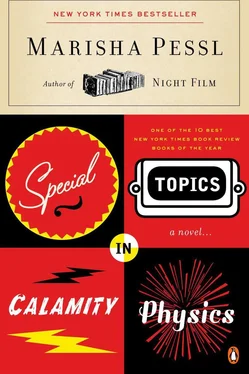It had all been a hoax.
Never had there been a rebellion more anticlimactic and second rate, except perhaps the “Gran Horizontes Tropicoco Uprising” in Havana in 1980, which, according to Dad, was composed of out-of-work big band musicians and El Loro Bonito chorus girls and lasted all of three minutes. (“Fourteen-year-old lovers last longer,” he’d noted.) And the longer I sat on the steps, the cruddier I felt. I pretended not to stare enviously at the happy kids slinging themselves and their giant backpacks into their parents’ cars, or the tall boys with untucked shirts rushing across the Commons, shouting at each other, cleats slung over their bony shoulders like tennis shoes over traffic wires.
By 5:10 P.M. I was doing my AP Physics homework on my knees and there was no sign of Dad. The lawns, the roofs of Barrow and Elton, even the sidewalks, had tarnished in the fading light of Depression-era photographs, and apart from a few teachers making their way to the Faculty Parking Lot (coal miners plodding home) it was all quite sad and silent, except for the oak trees fanning themselves like bored Southerners, a coach whistle far off on the fields.
“Blue?”
To my horror, it was Hannah Schneider, descending the steps behind me.
“What are you doing here at this hour?”
“Oh,” I said, smiling as joyously as I could. “My dad’s running late at work.” It was critical to appear happy and well loved; after school, teachers stared at kids unattended by parents as if they were suspicious packages abandoned in an airport lounge.
“You don’t drive?” she asked, stopping next to me.
“Not yet. I can drive. I just haven’t gotten my license.” (Dad didn’t see the point: “What, so you can cruise around town for a year before you go off to college like a nurse shark lazing around a reef desperate for guppies? I don’t think so. Next thing I know you’ll be wearing biker leather. Wouldn’t you prefer, anyway, to be chauffeured?”)
Hannah nodded. She wore a long black skirt and a yellow button-down sweater. While most teachers’ hair at the end of the day resembled crusty windowsill plants, Hannah’s — dark, but rusting a little in the late-day light — posed provocatively around her shoulders like Lauren Bacall in a doorway. It was strange for a teacher to be so guiltily watchable, so addictive. She was Dynasty, As the World Turns ; one felt something fantastically bitchy was about to happen.
“Jade will have to swing by and pick you up then,” she announced matter-of-factly. “It’s just as well. The house is difficult to find. This Sunday. Twoish, two-thirty. You like Thai food?” (She didn’t wait for my answer.) “Every Sunday I cook for them and you’re the guest of honor from now until the end of the year. You’ll get to know them. Gradually. They’re won derful kids. Charles is adorable and sweet, but the others can be difficult. Like most people they hate change, but everything good in life is an acquired taste. If they give you a hard time, remember it’s not you —it’s them. They’ll just have to get over themselves.” She gave one of those housewife commercial sighs (kid, carpet stain) and waved away an invisible fly. “How do you like your classes? Are you adjusting?” She spoke quickly and for some reason my heart was hitch-kicking excitedly in the air as if I were Orphan Annie and she was that wonderful character played by Anne Reinking who Dad said had spectacular legs.
“Yes,” I said, standing up.
“Wonderful.” She clasped her hands together — sort of like a fashion designer admiring his own fall line. “I’ll get your address from the office and give it to Jade.”
At this point, I noticed Dad in the Volvo, parked by the curb. He was probably watching us, but I couldn’t see his face, only his splotchy outline in the driver’s seat. The windshield and windows mirrored the oak trees and the yellowed sky.
“That must be your ride,” Hannah said, following my stare. “See you Sunday?”
I nodded. Her arm lightly around my shoulder — she smelled like pencil lead and soap, and, oddly enough, a vintage clothing store — she walked me toward the car, waving at Dad before continuing down the sidewalk toward the Faculty Parking Lot.
“You’re absurdly late,” I said, pulling the door closed.
“I apologize,” Dad said. “I was walking out of the office when the most appalling student marched in, held me hostage with the most mundane questions—”
“Well, it doesn’t look good. Makes me look like one of those unloved latchkey children they make after-school specials about.”
“Don’t sell yourself short. You’re more Masterpiece Theatre .” He started the car, squinting in the rearview mirror. “And that, I deduce, was the meddling woman from the shoe store?”
I nodded.
“What’d she want this time?”
“Nothing. Just wanted to say hello.”
I intended to tell him the truth; I’d have to, if on Sunday I wanted to run off with some “slack-jawed Suzy,” some “invertebrate,” a “post-pubescent wasteoid who imagines the Khmer Rouge to be makeup and Guerrilla Warfare to be that rivalry which occurs between apes”—but then we were accelerating past Bartleby Athletic Center and the football field where a crowd of shirtless boys leapt into the air like trout as they hit soccer balls with their heads. And as we rounded the chapel, Hannah Schneider was directly in front of us unlocking the door to an old red Subaru, one of the back doors dented like a Coke can. She brushed her hair off her forehead as she watched our passing car, and smiled. It was the distinct, secret smile of adulterous housewives, bluffing poker players, consummate con artists in mug shots and I decided, in that split second, to hold on to what she said, cup it tightly in my hands, setting it free only at the last possible second.
Dad, on Having a Secret, Well-Laid Plan: “There is nothing more delirious to the human mind.”
There was a poem Dad was quite fond of and knew by heart, entitled “My Darling,” or “Mein Liebling,” by the late German poet Schubert Koenig Bonheoffer (1862–1937). Bonheoffer was crippled, deaf, had only one eye, but Dad said he had been able to discern more about the nature of the world than most people in possession of all their senses.
For some reason, and perhaps unfairly, the poem always reminded me of Hannah.
“Where is the soul of my Darling?” I ask,
Oh, somewhere her soul must be,
It lives not in words, nor in promises,
Mutable as gold hers can be.
“It’s in the eyes,” the great poets say,
“’Tis where the soul must dwell.”
But watch her eyes; they glisten bright
At news of heaven and of hell.
I once believed her crimson lips,
Marked her soul soft as winter’s snow,
But then they curled at tales dismal, sad;
What it meant, I could not know.
I thought her fingers, then, her slender hands,
’Cross her lap, they’re delicate doves,
Though sometimes cold as ice to touch,
They surely hint of all she loves.
Aye, but there are moments she waves farewell,
I confess my Darling I do not follow,
She vanishes from view ’fore I reach the road,
Windows bare, house quiet and hollow.
And at times I wish I might read her walk,
Like a sailor his map o’ the sea,
Or find instructions for her looks,
Explaining all she hopes will be.
Читать дальше












